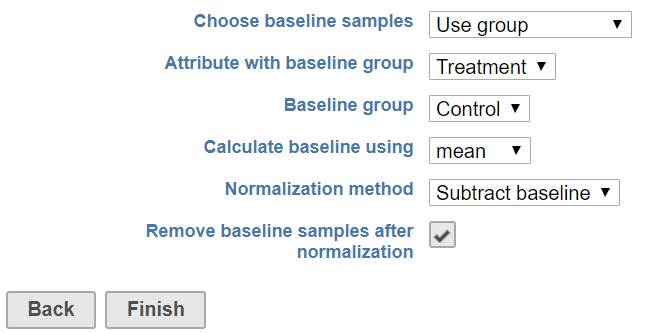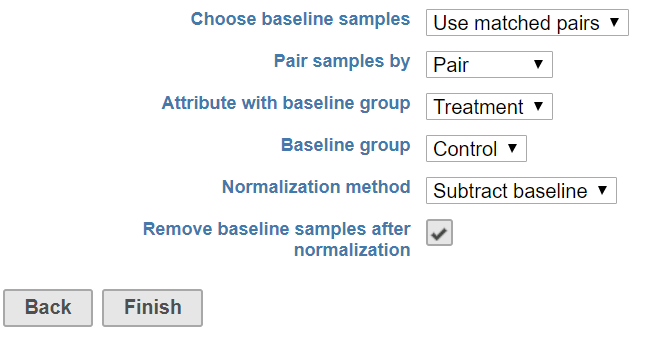If your experimental design includes a sample or a group of samples serving as a baseline control, you can normalize the experimental samples by subtracting or dividing by the baseline sample(s) using the Normalize to baseline task in Partek Flow. For example, in PCR experiments, the delta Ct values of control samples are subtracted from the delta Ct values of experimental samples to obtain delta-delta Ct values for the experimental samples.
The Normalize to baseline option is available in the Normalization and Scaling section of the context-sensitive menu (Figure 1) upon selection of any count matrix data node.
There are three options to choose the baseline samples:
- use all samples
- use a group
- use matched pairs
Use all samples to create baseline
To normalize data to all the samples, choose to calculate the baseline using the mean or median of all samples for each feature, and choose to subtract baseline or ratio to baseline for the normalization method (Figure 2), and click Finish.
Use a group to create baseline
When there is a subset of samples that serve as the baseline in the experiment, select use group for Choose baseline samples. The specific group should be specified using sample attributes (Figure 3).
Choose use group, select the attribute containing the baseline group information, e.g. Treatment in this example, with the samples with the group Control for the Treatment attribute used as the baseline. The control samples can be filtered out after normalization by selecting the Remove baseline samples after normalization check box.
Use matched pairs
When using matched pairs, one sample from each pair serves as the control. An attribute specifying the pairs must be selected in addition to an attribute designating which sample in each pair is the baseline sample (Figure 4).
After normalization, all values for the control sample will be either 0 or 1 depending on the normalization method chosen, so we recommend removing baseline samples when using matched pairs.
The output of Normalize to baseline is a Normalized counts data node.
Additional Assistance
If you need additional assistance, please visit our support page to submit a help ticket or find phone numbers for regional support.


| Your Rating: |
    
|
Results: |
    
|
29 | rates |



